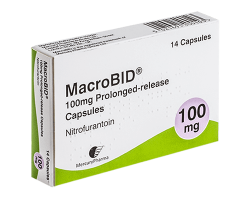Macrobid (nitrofurantoin) Coupons, Discounts & Cost
Macrobid (nitrofurantoin) is a synthetic antimicrobial agent that is used in the treatment of urinary tract infections only. One way to save money on the Macrobid retail cost regardless of income and insurance status is to use Macrobid coupons or discount cards from RXCoupons. Use this Nitrofurantoin coupon at this online pharmacy and receive up to 75% off the sale price.
Macrobid - pharmacological effects
Macrobid (nitrofurantoin) is a synthetic antimicrobial agent that is used in the treatment of urinary tract infections only. The drug belongs to the group of nitrofuran antibiotics with bactericidal and bacteriostatic action against gram-positive and gram-negative microflora (streptococcus, staphylococcus, salmonella, Shigella, Proteus). Nitrofurantoin is active against bacterial microflora of the urogenital tract. The drug is completely filtered through the kidneys.
Macrobid - indications for use
Macrobid is used for the treatment of bacterial diseases of the genitourinary system (acute and chronic diseases, complicated and uncomplicated cases: cystitis, urethritis, pyelonephritis). It is also used for prevention of bacterial complications in the urogenital tract, as well as for diagnostic tests.
Contraindications for Macrobid
Macrobid (nitrofurantoin) is not indicated for patients with intolerance (allergy) to the components of the drug, chronic kidney disease, liver failure with chronic hepatitis or cirrhosis of the liver, severe heart failure. Nitrofurantoin is not used during pregnancy, lactation (breastfeeding), as well as in children up to 1 month.
Macrobid side effects
The drug may cause dyspeptic complaints (nausea, vomiting, abdominal pain, etc.), hepatitis, cholestatic jaundice, headaches, dizziness, drowsiness, fatigue, allergic reactions, cough, bronchial obstruction (respiratory failure, shortness of breath).
Central nervous system: dizziness, headaches, drowsiness.
Gastrointestinal disorders: nausea, vomiting, hepatitis, pain in the abdomen, diarrhea, pancreatitis, cholestatic jaundice, anorexia (in extreme cases).
Respiratory system: fever, cough accompanied by chest pain, shortness of breath.
Hematopoietic system: leukopenia, granulocytopenia, agranulocytosis, thrombocytopenia, hemolytic anemia, megaloblastic anemia.
Allergic reactions: urticaria, angioedema, pruritus, rash; very rarely - anaphylactic shock.
Other reactions: myalgia, eosinophilia.
Severe side effects are rare, because the drug is well tolerated in most cases. In cases of overdose, which are extremely rare, you should immediately stop taking the drug and consult a doctor (overdose symptoms: nausea, vomiting, dizziness).
Special instructions
It is not recommended to consume alcohol while taking Macrobid.
Macrobid is not used with medications from the group of fluoroquinolones, quinolones (nalidixic acid, norfloxacin, pefloxacin, etc.) Such combinations may lead to a sharp decrease in the activity of nitrofurantoin.
Macrobid is administered with caution with drugs that increase the excretion of uric acid. For example, sulfinpyrazone decreases the excretion of nitrofurantoin and increases the risk of side effects.
Macrobid should not be used to treat certain disorders such as purulent paranephritis and prostatitis. Nitrofurantoin is not used in combination with drugs that cause renal dysfunction.
Macrobid is not used in patients with liver cirrhosis, chronic hepatitis.
Macrobid is not used in patients with renal failure, oliguria.
The risk of peripheral neuropathy is much higher in patients with severe renal insufficiency.
Macrobid is not used in early childhood (children up to 1 month).
How to use Macrobid
Take nitrofurantoin capsules during the meal. Drink more water with this medicine. The usual dose is of 50-100 mg 1-2 times a day. The dose for children under 12 years of age should be set by a physician.
One will see the effect within 1 hour. The drug works in the body for 6 hours. If you forget to take the pill, you can take it as soon as you remember. The dose should not be doubled. The course of treatment is not more than one week. If you suddenly feel unwell, you should seek medical advice.

